 W
WConstantin Argetoianu was a Romanian politician, one of the best-known personalities of interwar Greater Romania, who served as the Prime Minister between 28 September and 23 November 1939. His memoirs, Memorii. Pentru cei de mâine. Amintiri din vremea celor de ieri —a cross section of Romanian society, were made known for the sharp critique of several major figures in Romanian politics.
 W
WAlexandru Averescu was a Romanian marshal, diplomat and populist politician. A Romanian Armed Forces Commander during World War I, he served as Prime Minister of three separate cabinets. He first rose to prominence during the peasants' revolt of 1907, which he helped repress in violence. Credited with engineering the defense of Moldavia in the 1916–1917 Campaign, he built on his popularity to found and lead the successful People's Party, which he brought to power in 1920–1921, with backing from King Ferdinand I and the National Liberal Party (PNL), and with the notable participation of Constantin Argetoianu and Take Ionescu.
 W
WElena A. Bacaloglu, also known as Bakaloglu, Bacaloglu-Densusianu, Bacaloglu-Densușeanu etc., was a Romanian journalist, literary critic, novelist and fascist militant. Her career in letters produced an introduction to the work of Maurice Maeterlinck (1903), several other critical essays, and two novels. She married and divorced writer Radu D. Rosetti, then Ovid Densusianu, the Symbolist poet and literary theorist.
 W
WEmanoil Băleanu, was a Wallachian statesman, soldier and industrialist who served as Caimacam (regent) in October 1858–January 1859. Descending from an old family of boyars, he was one of two sons born to Ban Grigore III Băleanu; the other, Nicolae, was a career bureaucrat, and the State Secretary of Wallachia in 1855–1856. Although prone to displays of Romanian nationalism, the family was prominent under the cosmopolitan Phanariotes, and young Băleanu was educated in Greek. Prince Alexandros Soutzos welcomed him at the court and became his father-in-law. At that stage, Băleanu's participation in the spoils system was signaled by his highly controversial claim to ownership of Târgoviște city, and also by his monopoly on handkerchief manufacture. A slaveowner, he founded the village of Bolintin-Deal, initially populated by his captive Romanies.
 W
WGeorge "Gigi" Becali is a Romanian businessman and politician, mostly known for his ownership of the FCSB football club. He was a Member of the European Parliament between June 2009 and December 2012, and a Member of the Romanian Parliament from December 2012 up until his conviction in May 2013.
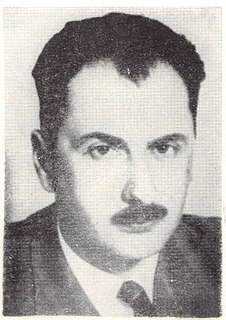 W
WGheorghe (George) I. Brătianu was a Romanian politician and historian. A member of the Brătianu family and initially affiliated with the National Liberal Party, he broke away from the movement to create and lead the National Liberal Party-Brătianu. A history professor at the universities of Iași and Bucharest, he was elected titular member of the Romanian Academy. Arrested by the Communist authorities in 1950, he died at the notorious Sighet Prison.
 W
WConstantin G. Cantacuzino, also known as Costache Cantacozino or Costandin Cantacuzino, was the Caimacam (Regent) of Wallachia in September 1848–June 1849, appointed directly by the Ottoman Empire. A member of the Cantacuzino family, he had emerged as a leader of the conservative boyardom during the Regulamentul Organic period. As a commander in the Wallachian militia, he organized in 1831 the first elections for Bucharest's Town Council, and subsequently served as one of the Bucharest Governors. He first played a major part in national government from 1837 to 1842, when he served Prince Alexandru II Ghica as Postelnic and Logothete. During that interval, he clashed with his own brother Grigore Cantacuzino, who sided with the liberal current.
 W
WIlie V. Cătărău was a Bessarabian-born political adventurer, soldier and spy, who spent parts of his life in Romania. Leading a secretive life, he is widely held to have been the main perpetrator of two bomb attacks, which sought to exacerbate tensions between Romania and Austria-Hungary in preparation for World War I. Beyond his cover as a refugee from the Russian Empire, Ilie Cătărău was a double agent, working for both Russian and Romanian interests.
 W
WMircea Chelaru is a Romanian general and the last leader of the Romanian National Unity Party (PUNR) after Gheorghe Funar resigned as leader. After the PUNR was absorbed by the PC, Chelaru stepped down from his position.
 W
WVictor Ciorbea is a Romanian jurist, politician and civil servant. He was the Mayor of Bucharest in 1996–1997 and, after his resignation from office, Prime Minister of Romania from 12 December 1996 to 30 March 1998. He was the People's Advocate between 2014 and 2019.
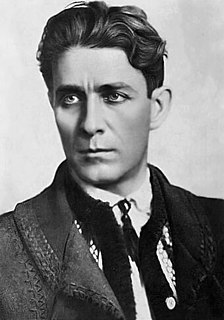 W
WCorneliu Zelea Codreanu —born Corneliu Zelinski and commonly known as Corneliu Codreanu—was a Romanian politician of the far right, the founder and charismatic leader of the Iron Guard or The Legion of the Archangel Michael, an ultranationalist and violently antisemitic organization active throughout most of the interwar period. Generally seen as the main variety of local fascism, and noted for its mystical and Romanian Orthodox-inspired revolutionary message, it gained prominence on the Romanian political stage, coming into conflict with the political establishment and the democratic forces, and often resorting to terrorism. The Legionnaires traditionally referred to Codreanu as Căpitanul, and he held absolute authority over the organization until his death.
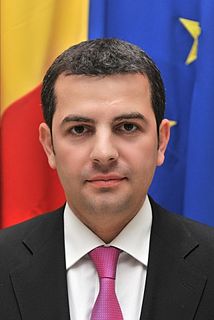 W
WDaniel Constantin is a Romanian politician who is currently a member of the National Liberal Party (PNL).
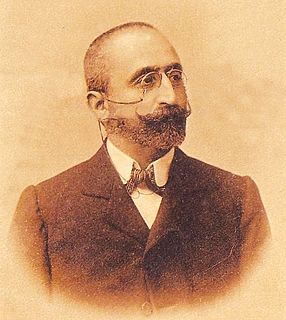 W
WAlexandru C. Cuza, also known as A. C. Cuza, was a Romanian far-right politician and economist.
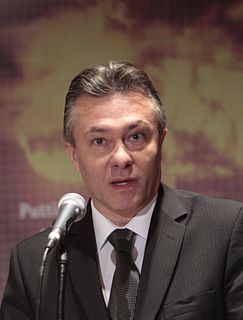 W
WCristian Diaconescu is a Romanian jurist and politician. The leader of the People's Movement Party (PMP), he previously belonged to the National Union for the Progress of Romania (UNPR) and the Social Democratic Party (PSD). He sat in the Romanian Senate from 2004 to 2012, representing Constanța County from 2004 until 2008, and subsequently Bucharest. In the Adrian Năstase cabinet, he was Minister of Justice from March to December 2004; in the Emil Boc cabinet, he was Minister of Foreign Affairs between 2008 and 2009. He returned to the position in 2012, also under Boc, and continued in this capacity under Boc's successor, Mihai Răzvan Ungureanu.
 W
WDan Cristian Diaconescu is a Romanian journalist, politician, presenter, the founder and owner of the former DDTV and OTV television channels. He graduated from the Faculty of Mechanical Engineering, part of the Polytechnic Institute of Bucharest. In 2010, together with OTV show presenters, he formed the People's Party – Dan Diaconescu (PP-DD).
 W
WGeorge Ion Diamandy or Diamandi, first name also Gheorghe or Georges, was a Romanian politician, dramatist, social scientist, and archeologist. Although a rich landowner of aristocratic background, he was one of the pioneers of revolutionary socialism in France and Romania, obtaining international fame as founder of L'Ère Nouvelle magazine. He was an early affiliate of the Romanian Social-Democratic Workers' Party, but grew disenchanted with its radical policies, and, as a member of its "generous youth" faction, played a major part in dissolving it. With other members of this reformist group, he joined the National Liberal Party, serving as one of its representatives in Chamber.
 W
WConstantin I. Dobrescu, better known as Dobrescu-Argeș, was a Romanian peasant activist and politician, also active as a teacher, journalist, and jurist. Active from his native Mușătești, in Argeș County, he established a regional, and finally national, base for agrarian politics. He is considered Romania's second agrarianist, after Ion Ionescu de la Brad, and, with Dincă Schileru, a revivalist of the peasant cause in the Romanian Kingdom era. Dobrescu was notoriously unpersuaded by agrarian socialism, preferring a mixture of communalism and Romanian nationalism, with some echoes of conservatism. Thus, he stopped short of advocating land reform, focusing his battles on democratization through universal suffrage, and on obtaining state support for the cooperative movement. He himself founded some of the Kingdom's first cooperatives, also setting up model schools, the first rural theater, and the first village printing press—which put out his various periodicals.
 W
WGrigore N. Filipescu was a Romanian politician, journalist and engineer, the chief editor of Epoca daily between 1918 and 1938. He was the scion of an aristocratic conservative family, son of the statesman Nicolae Filipescu and a collateral descendant of Alexandru II Ghica. During the early stages of World War I, he and his father led a pro-Allied dissident wing of the Conservative Party. After serving on the front, and behind the lines to 1918, as aide to General Alexandru Averescu, Filipescu Jr. became his political adviser. He had a stint in the Labor Party, merged into Averescu's own People's Party. Filipescu served as the latter group's tactician and campaigner, but had irreconcilable differences with Averescu.
 W
WNicolae Fleva was a Wallachian, later Romanian politician, political journalist and lawyer. Known especially for his involvement in political incidents, and for a stated patriotism bordering on demagogy, he tested all political formulas that Romania's two-party system would allow. His activity in the public sphere brought a decades-long presence in the Assembly of Deputies and a mandate as Mayor of Bucharest between 1884 and 1886.
 W
WOctavian Goga was a nationalistic and later far-right Romanian politician, poet, playwright, journalist and translator.
 W
WGeorge Grigorovici or Gheorghe Grigorovici was an Austro-Hungarian-born Romanian politician.
 W
WPetru Groza was an Austro-Hungarian-born Romanian politician, best known as the first Prime Minister of the Communist Party-dominated government under Soviet occupation during the early stages of the Communist regime in Romania, and later as the President of the Presidium of the Great National Assembly from 1952 until his death in 1958.
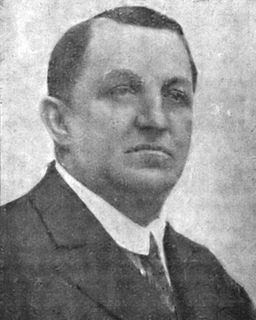 W
WAvram Imbroane was an Austro-Hungarian-born Romanian politician, businessman, and Orthodox priest. Born in the western half of Banat, he was active in nationalist agitation among that region's Romanian community, and later also in Transylvania. By the time of World War I, he supported secession and the unconditional union of Transylvania and the Banat with the Kingdom of Romania. He fled Austria-Hungary and engaged in propaganda work—first in Romania, then among the Transylvanian prisoners-of-war in the Russian Republic. In late 1918, he returned to the Banat and became an active participant in the unionist struggle, participating in the assemblies of the Great Union.
 W
WNicolae Ionescu was a Romanian politician, jurist and publicist, brother of the agronomist Ion Ionescu de la Brad. He was leader of the Free and Independent Faction, serving several terms in Chamber and Senate, most often as a representative of Roman County, and was helped to establish several liberal coalitions in the 1860s and '70s. His career peaked just before the Romanian War of Independence, when he was Minister of Foreign Affairs in the cabinet of Ion Brătianu. Ionescu ended his career in politics with the National Liberal Party. A professor of law and a rector of Iași University, he was also one of the founding members of the Romanian Academy.
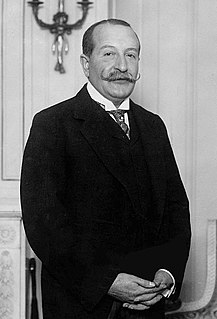 W
WTake or Tache Ionescu was a Romanian centrist politician, journalist, lawyer and diplomat, who also enjoyed reputation as a short story author. Starting his political career as a radical member of the National Liberal Party (PNL), he joined the Conservative Party in 1891, and became noted as a social conservative expressing support for several progressive and nationalist tenets. Ionescu is generally viewed as embodying the rise of middle-class politics inside the early 20th century Kingdom of Romania, and, throughout the period, promoted a project of Balkan alliances while calling for measures to incorporate the Romanian-inhabited Austro-Hungarian regions of Transylvania, Banat and Bukovina. Representing his own faction inside the Conservative Party, he clashed with the group's leadership in 1907–1908, and consequently created and led his own Conservative-Democratic Party.
 W
WNicolae Iorga was a Romanian historian, politician, literary critic, memoirist, poet and playwright. Co-founder of the Democratic Nationalist Party (PND), he served as a member of Parliament, President of the Deputies' Assembly and Senate, cabinet minister and briefly (1931–32) as Prime Minister. A child prodigy, polymath and polyglot, Iorga produced an unusually large body of scholarly works, establishing his international reputation as a medievalist, Byzantinist, Latinist, Slavist, art historian and philosopher of history. Holding teaching positions at the University of Bucharest, the University of Paris and several other academic institutions, Iorga was founder of the International Congress of Byzantine Studies and the Institute of South-East European Studies (ISSEE). His activity also included the transformation of Vălenii de Munte town into a cultural and academic center.
 W
WBarbu Lăzăreanu was a Romanian literary historian, bibliographer, and left-wing activist. Of Romanian Jewish background, he became noted for both his social criticism and his lyrical pieces while still in high school, subsequently developing as a satirist and printing his own humorous magazine, Țivil-Cazon. Lăzăreanu's youthful sympathies veered toward the anarchist underground, prompting him to associate with Panait Mușoiu.
 W
WStroe Leurdeanu, also known as Stroe (sin) Fiera, Stroie Leurdeanu, Stroe Leordeanu, or Stroe Golescu, was a Wallachian statesman and political intriguer, son of Logothete Fiera Leudeanu. He began his career with the Wallachian military forces, serving as Spatharios and seeing action in the Polish–Ottoman War of 1633. Related by marriage to the Craiovești dynasty, he emerged as one of the country's most important officials under Prince Matei Basarab: as Vistier, he was in charge of the princely treasury, and also became a regent in 1645. Matei also adopted Stroe's son, Istratie Leurdeanu, but in 1651 turned against the family, and found Stroe guilty of embezzlement. He returned to high favor under a new Prince, Constantin Șerban, who made him his Logothete.
 W
WNicolae L. Lupu was a Romanian left-wing politician and social physician. Originally a leader of the Labor Party, which was joined with the Peasants' Party, Lupu served as Interior Minister in 1919–1920. He formed his own Peasants' Party–Lupu in 1927, and also steered the creation of a League Against Usury. His group became a dissident faction of the National Peasants' Party, and was reestablished, after World War II, as the Democratic Peasants' Party–Lupu.
 W
WIuliu Maniu was an Austro-Hungarian-born lawyer and Romanian politician. He was a leader of the National Party of Transylvania and Banat before and after World War I, playing an important role in the Union of Transylvania with Romania.
 W
WNicolae Manolescu is a Romanian literary critic. As an editor of România Literară literary magazine, he has reached a record in reviewing books for almost 30 years. Elected a corresponding member of the Romanian Academy in 1997, he was upgraded to titular member in 2013.
 W
WIon Mihalache was a Romanian agrarian politician, the founder and leader of the Peasants' Party (PȚ) and a main figure of its successor, the National Peasants' Party (PNȚ).
 W
WIlie B. Moscovici was a Romanian socialist militant and journalist, one of the noted leaders of the Romanian Social Democratic Party (PSDR). A socialist since early youth and a party member since its creation in 1910, he returned from captivity in World War I to lead the PSDR from Bucharest, and involved himself in a violent clash with the Romanian authorities. He mediated between reformist and Bolshevik currents, and helped establish the Socialist Party of Romania (PS) as a fusion of both tendencies. Moscovici served as a PS representative in Chamber, but was deposed over his instigation of the 1920 general strike, then imprisoned. Although he voted against the creation of a Communist Party from the rump PS and criticized Comintern interference in Romanian affairs, he was again apprehended in 1921. Together with the communists, he appeared as a defendant in the Dealul Spirii Trial.
 W
WIon I. Nistor was a Romanian historian and politician. He was a titular member of the Romanian Academy from 1915 and a professor at the universities of Cernăuți and Bucharest, while also serving as Minister of State for Bukovina, Minister of Public Works, Minister of Labor, and Minister of Religious Affairs and the Arts with a number of governments from 1918 to 1940.
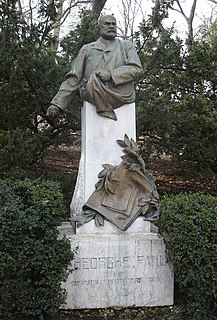 W
WGeorge Panu was a Moldavian, later Romanian memoirist, literary critic, journalist and politician. A native of Iași, educated there as well as in Paris and Brussels, he worked as a schoolteacher and lawyer, but made a name for himself in politics and journalism. His outlook was a radical one that shared common goals with the socialist movement. Noted for his bitter polemics, he served several terms in parliament, alternating between the main parties as well as heading his own small faction for nearly a decade. In the last years of his life, Panu wrote a valuable memoir detailing his experiences in the Junimea literary society, of which he had become an implacable adversary.
 W
WChristian Georgievich Rakovsky was a Bulgarian-born socialist revolutionary, a Bolshevik politician and Soviet diplomat and statesman; he was also noted as a journalist, physician, and essayist. Rakovsky's political career took him throughout the Balkans and into France and Imperial Russia; for part of his life, he was also a Romanian citizen.
 W
WMihai Dumitru Ralea was a Romanian social scientist, cultural journalist, and political figure. He debuted as an affiliate of Poporanism, the left-wing agrarian movement, which he infused with influences from corporatism and Marxism. A distinguished product of French academia, Ralea rejected traditionalism and welcomed cultural modernization, outlining the program for a secular and democratic "peasant state". His ideology blended into his scholarly work, with noted contributions to political sociology, the sociology of culture, and social and national psychology. He was a professor at the University of Iași and, from 1938, the University of Bucharest.
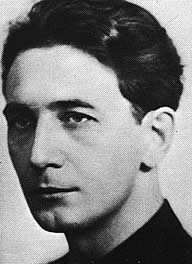 W
WHoria Sima was a Romanian fascist politician, best known as the second and last leader of the fascist paramilitary movement known as the Iron Guard. Sima was also the vice president of the council of ministers and de facto co-leader in Ion Antonescu's National Legionary State. Sima had previously served briefly as State Secretary of Education under Gheorghe Tătărescu in 1940, and as a short-lived Minister of Religion and Arts in the government of Ion Gigurtu. In January 1941, Sima initiated and led the Legionnaires' Rebellion against Conducător Ion Antonescu and the Romanian Army, for which he was sentenced to death, as well as the Bucharest pogrom, the largest and most violent pogrom against Jews in the history of Muntenia. Following the rebellion, Sima escaped to Germany, and later to Spain, where he lived until his death.
 W
WGeorge Nicolae Simion is a Romanian right-wing politician, civic activist, and writer. Together with Claudiu Târziu, he is the co-president of the Alliance for the Union of Romanians (AUR), a political party in Romania that gained popularity after its unexpected high score in the 2020 Romanian legislative election.
 W
WCodrin Ștefănescu is a Romanian politician, former deputy between 2000 and 2004 and the founder and incumbent President of the Alliance for the Fatherland (APP).
 W
WMihai Stelescu was a Romanian political activist.
 W
WAlexandru Barbu Știrbei, also rendered Alex. Știrbeĭ, Știrbey, or Știrbeiŭ, was a Wallachian-born Romanian aristocrat, politician, businessman and agriculturalist, the son of Barbu Dimitrie Știrbei, Prince of Wallachia, younger brother of George Barbu Știrbei, and nephew of another Prince, Gheorghe Bibescu. After a short career in the French Army, he returned to the United Principalities and served terms in their Assembly of Deputies, inheriting the fortune left by his father. He established pioneering industries around his manorial estates of Buftea and Dărmănești, and became a guest, and sometime host, of literary meetings held by the political club Junimea.
 W
WGeorge Barbu Știrbei or Știrbeiŭ, also known as Gheorghe, Georgie, or Iorgu Știrbei, was a Wallachian-born Romanian aristocrat and politician who served as the Minister of Foreign Affairs from July 15, 1866 until February 21, 1867. He was the eldest son of Barbu Dimitrie Știrbei, Prince of Wallachia, and the nephew of his rival, Gheorghe Bibescu; his younger siblings included the landowner and industrialist Alexandru B. Știrbei. Educated in France, he returned to Wallachia during his father's princely mandate, as a Beizadea and aspiring politician. Fleeing his country during the Crimean War, he served the French Empire before returning home to become Wallachian Minister of War and Spatharios. He is remembered for reforming the Wallachian militia during the remainder of Prince Barbu's term.
 W
WEmil Străinu is a Romanian army general in reserve, writer, journalist, ufologist, and politician. He was the leader of the Greater Romania Party. He is a founding member of ASFAN.
 W
WBenno or Beno Straucher was a Bukovina-born Austro-Hungarian lawyer, politician and Jewish community representative, who spent the final part of his career in Romania. A Jewish nationalist influenced by classical liberalism and Zionism, he first held political offices in Czernowitz city. After 1897, he was one of the noted Jewish representatives in the Austrian Parliament's upper chamber (Abgeordnetenhaus). Straucher, who was instrumental in creating the reformist Progressive Peasants' Fellowship, maintained his Abgeordnetenhaus seat throughout the remainder of Austria-Hungary's existence. From 1906, he led the Jewish National People's Party locally and helped establish the pan-Austrian Jewish National Party. He vied for political direction over the Bukovina Jews with several other groups, most notably the Zionist People's Council Party of Mayer Ebner, who became his personal rival.
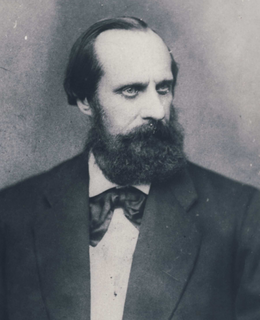 W
WGrigore Mihail Sturdza, first name also Grigorie or Grigori, last name also Sturza, Stourdza, Sturd̦a, and Stourza, was a Moldavian, later Romanian soldier, politician, and adventurer. He was the son of Prince Mihail Sturdza, and a scion of ancient boyardom, and, during the 1840s, an heir apparent to the Moldavian throne, for which he was known throughout his later life as Moldavia's Beizadea. A rebellious youth famous for his feats of strength, he set up his own private militia which he used to corner the Moldavian grain trade, and entered a legal battle with Sardinian retailers. In 1845, he defied his father, and French law, by seeking to marry the much older, already married Countess Dash, and barricaded himself with her at Perieni. By 1847, Grigore had been reintegrated into the Moldavian establishment, and, as a general in the Moldavian princely militia, personally handled repression during the attempted revolution of April 1848. During these events, the Beizadea became personal enemies with three future statesmen—Alexandru Ioan Cuza, Mihail Kogălniceanu, and Manolache Costache Epureanu.
 W
WClaudiu Richard Târziu is a Romanian right-wing politician and journalist. Together with George Simion, he is the co-president of the Alliance for the Union of Romanians (AUR), a political party in Romania that gained popularity after its unexpected high score in the 2020 Romanian legislative election.
 W
WEugen Tomac is a Romanian politician, historian and journalist currently serving as MEP in the European Parliament for Romania since 2019. He was also the President of the People's Movement Party (PMP).
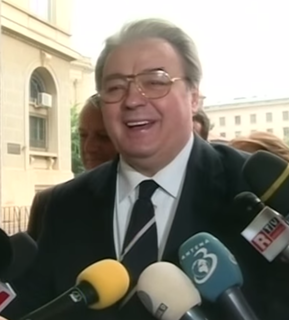 W
WCorneliu Vadim Tudor also colloquially known as "Tribunul", was the leader of the Greater Romania Party, poet, writer, journalist, and a Member of the European Parliament. He was a Romanian Senator from 1992 to 2008. He was born and died in Bucharest, Romania.
 W
WAlexandru Vaida-Voevod or Vaida-Voievod was an Austro-Hungarian-born Romanian politician who was a supporter and promoter of the union of Transylvania with the Romanian Old Kingdom. He later served as 28th Prime Minister of Romania.
 W
WGeorge D. Vernescu was a Wallachian-born Romanian politician.
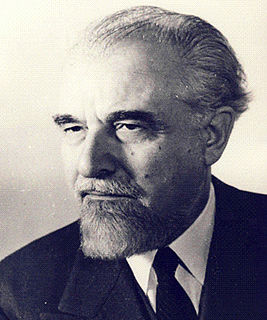 W
WȘtefan Voitec was a Romanian Marxist journalist and politician who held important positions in the state apparatus of Communist Romania. Debuting as a member of the Socialist Party of Romania in his late teens, he formed the Socialist Workers Party of Romania, then the United Socialist Party, while also engaging in human rights activism and advocating prison reform. The mid 1930s brought him into contact with the Romanian Communist Party, with whom he formed tactical alliances; however, he rejected its political line, and was for a while known as a Trotskyist. In 1939, he joined the consolidated Social Democratic Party, which reunited various socialist groups outlawed by the National Renaissance Front. During World War II, despite ostensibly withdrawing form political life to do research, Voitec served as the party's Secretary and joined the anti-fascist underground. Some reports suggest that he was also a committed anti-communist, critical of the Soviet Union to the point on endorsing war in the East. As a war correspondent, Voitec made contributions to Nazi propaganda, an issue which made him vulnerable to blackmail in later decades.
 W
WAbraham Leib Zissu was a Romanian writer, political essayist, industrialist, and spokesman of the Jewish Romanian community. Of lowly social origin and a recipient of Hasidic education, he became a noted cultural activist, polemicist, and newspaper founder, remembered primarily for his Mântuirea daily. By the end of World War I, he emerged as a theorist of Religious Zionism, preferring communitarianism and self-segregation to the assimilationist option, while also promoting literary modernism in his activity as novelist, dramatist, and cultural sponsor. He was the inspiration behind the Jewish Party, which competed with the mainstream Union of Romanian Jews for the Jewish vote. Zissu and Union leader Wilhelm Filderman had a lifelong disputation over religious and practical politics.